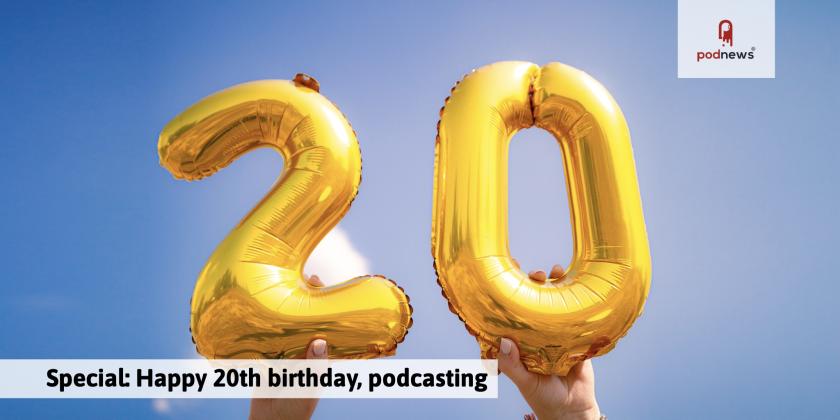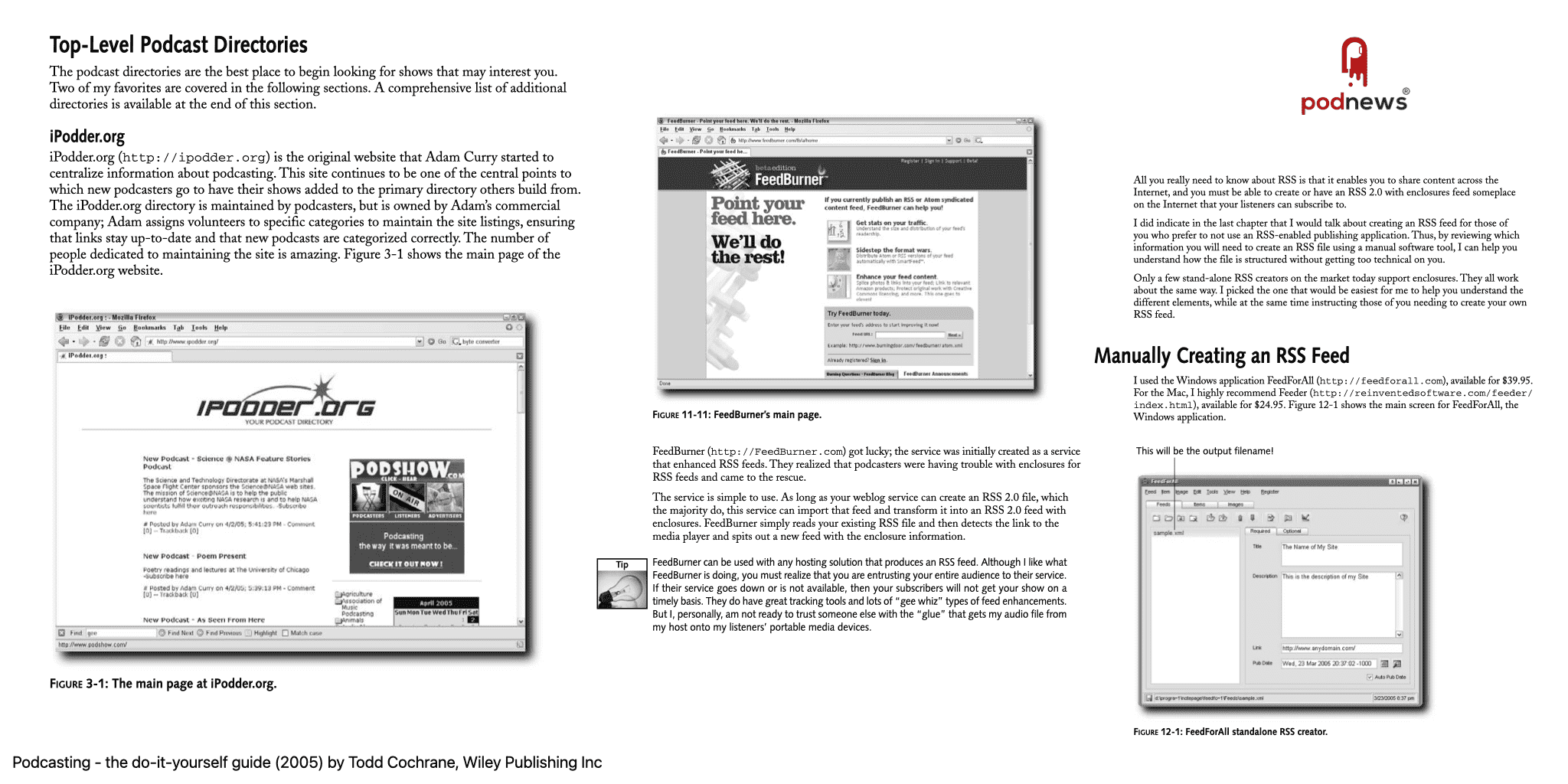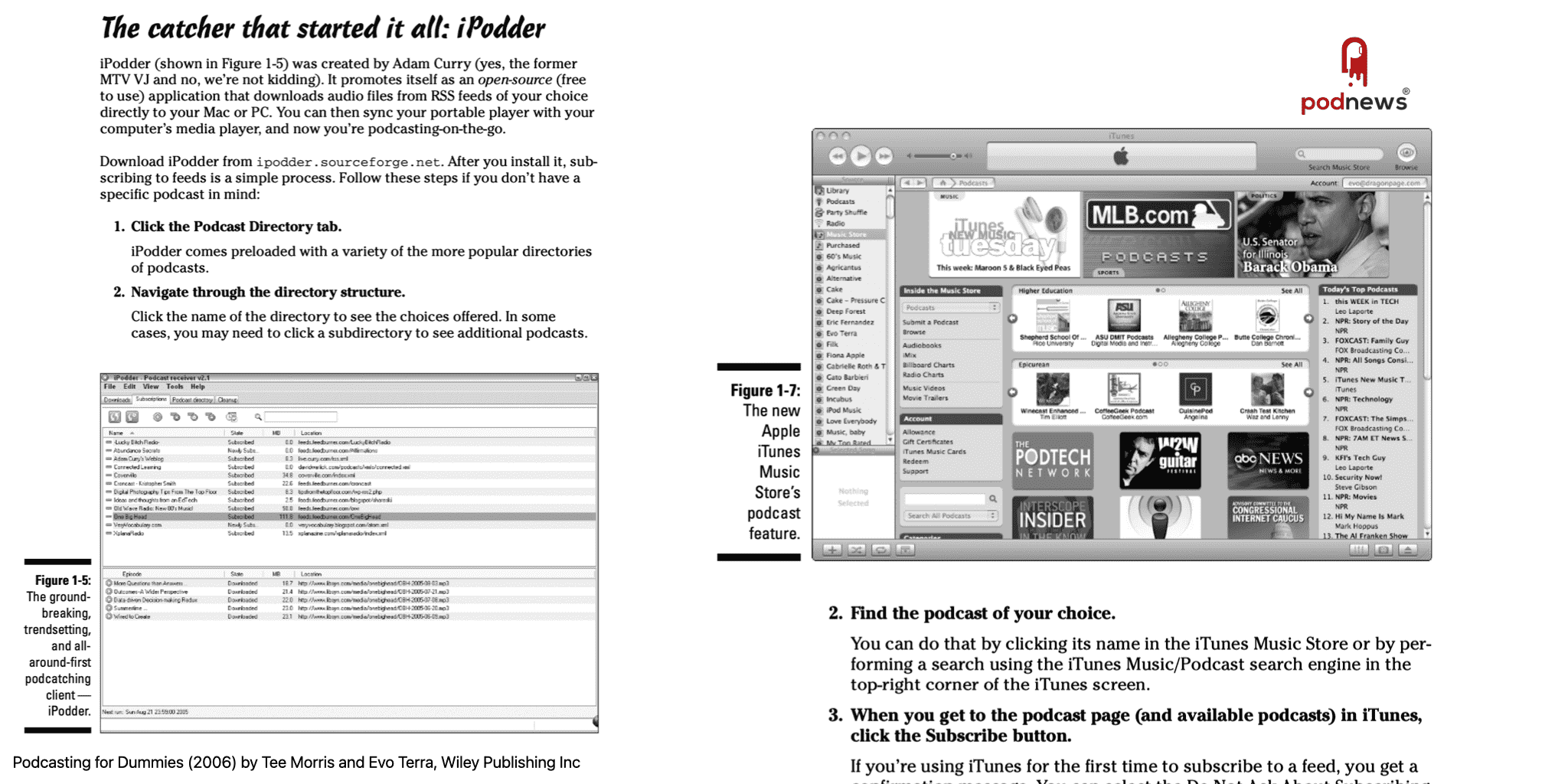
Special: Happy 20th Birthday, Podcasting
This article is at least a year old
- Podcasting started on Jul 9, 2003
- There are now 4.1mn podcasts on open RSS
- 42% of Americans now listen to a podcast monthly
- US podcast ad revenue is now worth $1.8bn
On Sunday, podcasting will be 20 years old. In a special edition today, we speak to the first podcaster - and look back at our medium’s first twenty years.
Podcasting, 20 years on
The changing face of podcasting

Podcasting: the do-it-yourself guide by Todd Cochrane, published in early 2005, included websites like iPodder, Feedburner and software to manually create an RSS feed.

By June 2005, Apple had added podcasts to iTunes, highlighted here alongside iPodder by Podcasting for Dummies, by Tee Morris and Evo Terra.
Podcasting’s first steps
Adam Curry wrote a blog post called The Last Yard, where he wondered aloud about what might happen when homes had always-on internet connections and always-on computers connected to it.
I want my Always On PC to manage my entertainment for me. Please Mr Cube, get the new SMIL file from a channel, suck in the content needed for it, render it on my PC and THEN tell me it’s ready.
This idea piqued the interest of software engineer and blogger Dave Winer. In October 2000, he posted:
In New York I spent the better part of two days brainstorming with Adam Curry, former MTV video jock, Internet advertising entrepreneur, and now a man obsessed with a vision that I’m beginning to understand.
By January 2001, Dave Winer had the idea of using an RSS feed with enclosures: and had produced the first podcast feed, which enclosed a Grateful Dead song. But it took a while later for the first podcast to be made.
On July 9, 2003 Christopher Lydon and Dave Winer recorded the first podcast, using a recorder and laptop in Harvard University. It was the first piece of audio that would be distributed using an enclosure referenced in an RSS feed. That podcast, now called Open Source, is the longest-running podcast in the world.
Christopher Lydon
We spoke to Christopher Lydon and his producer Mary McGrath late on Thursday.
JC: When you sat down with Dave Winer 20 years ago, and you recorded what became your first podcast… did you think this was the start of something?
CL: I did. There was a tingle of experimental adventure, and I thought it was a moment because the Iraq war was already a moment, in my view, completely unexamined and debated - an illegal American war, a horror story unfolding. I thought on a podcast people could break the public silence and say just that. And they did. Suddenly the people had a voice. I thought that was critically interesting and important.
JC: The latest research says that 42% of Americans are listening to podcasts every month. Why do you think podcasts are now so popular?
CL: Well, there are so many kinds, James, as you know better than I. I think the American people are starving for good conversation, and they find enough of it to come back time and again to podcasts. That’s a very broad statement, but I think we’re just we’re evolving a new conversational system in this far flung democracy, and podcasting has a peculiar place in it, a very energetic, interesting place.
JC: Instead of just bloggers and academics, podcasting is now dominated by very large companies. What do you think of that?
CL: It’s not the way I expected it. I mean, the instant commercialisation of this space, it was a surprise and I’d say a disappointment; but on the other hand, it’s okay. They have their audience, I guess.
We belong to Hub & Spoke - really, some extraordinary people and voices all over the place. I love the spirit of this little collective.
Tamar Avishai - in The Lonely Palette - does art criticism for real people. Erica Heilman - in Rumble Strip - does her own reflections in the northern tip of Vermont with the natives - regular people - and that’s another peculiarly powerful voice. We do our own thing, but there’s room for everybody.
JC: Has podcasting changed the way you thought it would, twenty years on?
CL: Yes - it’s bigger; it is more commercial. It’s not monopolized - you cannot monopolize the human voice. And it’s still growing.
If the Martian landed and said “take me to your real voices” to get the pulse of this nation, I’d say: “try the podcasts”.
It’s made the world more interesting for a lot of people. Three cheers.
You can read a full version of this interview in the Podcast Business Journal later today; and hear it next week in the Podnews Weeekly Review.
Podcast News

Podcast data for Jul 7
#1 in Apple Podcasts The Retrievals (Serial Productions & The New York Times)
The Retrievals (Serial Productions & The New York Times)
#1 in Spotify The Joe Rogan Experience (Joe Rogan)
Who shat on the floor at my wedding? (Who shat on the floor at my wedding?)
Over the last week, 196,133 podcasts published at least one new episode (down 4.9%). source
































































































